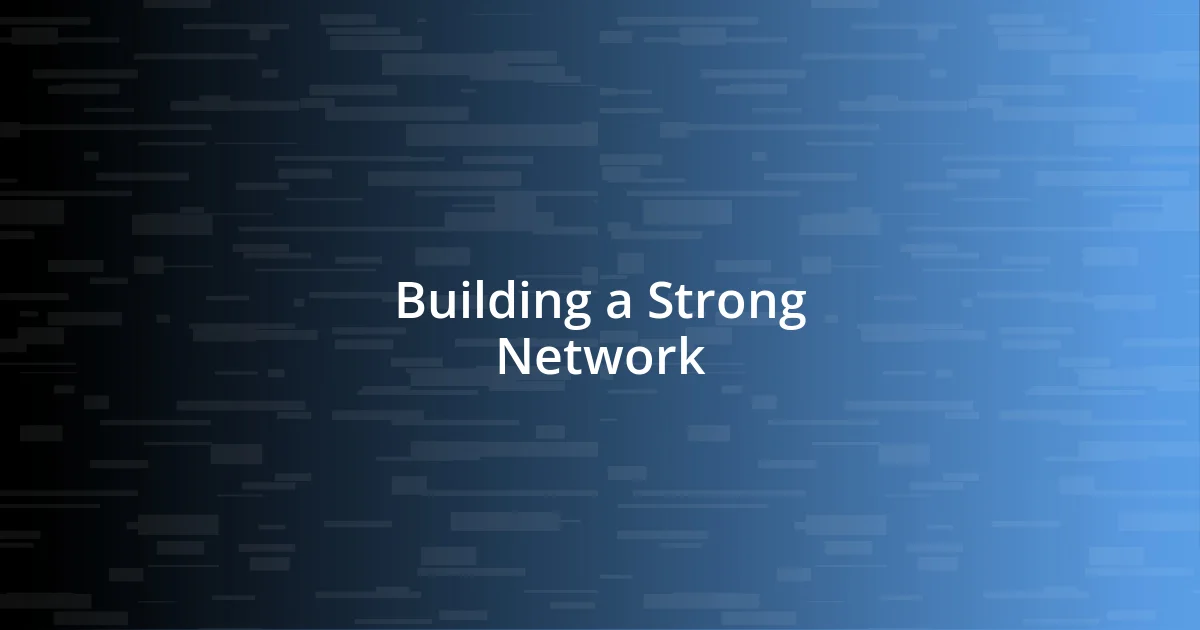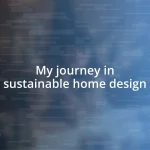Key takeaways:
- Off-market listings present unique advantages such as less competition, direct negotiations with sellers, and potential for better pricing due to exclusivity.
- Building strong networks and engaging with local communities can lead to valuable insights and opportunities for discovering off-market properties.
- Effective negotiation involves empathy, preparedness with market data, and collaborative approaches to foster trust and reach mutually beneficial agreements.

Understanding Off-Market Listings
Off-market listings, in my experience, represent hidden gems in the real estate world. These are properties that aren’t officially listed on multiple listing services (MLS), making them less accessible to the general public. I recall a time when I stumbled upon a charming home simply because a friend mentioned the owners were considering selling without formal listing. Didn’t it feel like finding a secret treasure?
One of the intriguing aspects of off-market listings is the motivation behind them. Sellers might opt for privacy or wish to avoid the hassle of showings and open houses. Personally, I’ve noticed that these deals often lead to less competition, allowing buyers to potentially negotiate better terms. Have you ever thought about how much can be gained from a seller’s perspective? The emotional weight of selling a home can influence their decisions, often leaning towards a more personal connection with potential buyers.
Moreover, understanding off-market listings requires proactive effort and a network of relationships. This isn’t just about scrolling through websites; it’s about engaging with local community members and realtors. I remember joining a community group and casually mentioning my home search—it led to several leads that I never would have discovered elsewhere. Isn’t it fascinating how opportunities can arise simply through conversation and connection?

Benefits of Off-Market Properties
Finding off-market properties offers unique advantages that can truly enrich the buying experience. From my own journey, I’ve realized that these properties often come with less competition, which can mean more flexibility in negotiations. I remember coming across a lovely townhouse that wasn’t on the market, and because of the lack of interest from others, I managed to secure it at a lower price than I initially anticipated. It felt like a personal victory, benefiting not just from the deal but also from the connections made along the way.
Here’s why off-market properties stand out:
- Less Competition: Fewer buyers vying for the same property can lead to better offers.
- Direct Seller Negotiations: Engaging directly with sellers can facilitate more personalized negotiations.
- Privacy for Sellers: Homeowners often prefer to keep their sale private, allowing for a more discreet process.
- Potential for Better Pricing: With a less frantic market, there’s a higher chance of negotiating favorable terms and pricing.
- Varied Options: Off-market listings may include unique properties not typically available through traditional channels.
Each encounter with an off-market property has opened my eyes to the wealth of possibilities that exist outside the conventional listings, often through just a casual mentions or mutual acquaintances. Isn’t it exciting to think about what hidden treasures you might uncover next?

Researching Neighborhoods Thoroughly
Researching neighborhoods thoroughly is a crucial step in my strategy for discovering off-market listings. When I delve into a particular area, I look beyond the standard metrics like median home prices. I consider the neighborhood vibe, local amenities, and even the community’s culture. For instance, I once found an off-market listing in a quaint neighborhood that had a weekly farmer’s market and a strong sense of community. That lively atmosphere made the property feel even more desirable, showing me how important the environment is when searching for hidden gems.
I often find that connecting with locals provides insights that online research simply can’t. On one occasion, while enjoying coffee in a local café, I struck up a conversation with the barista about the housing market. To my surprise, she tipped me off about a potential sale of a home just a few blocks away that wasn’t listed yet. This felt incredible to me, as it reinforced the idea that personal interactions can lead to invaluable information—everyone enjoys sharing their knowledge about their community.
Another aspect to consider is the historical context of a neighborhood. Learning about past sales trends can guide my understanding of what to expect in terms of pricing and availability. I remember reviewing listings from the previous year for a promising area and noticing a pattern: homes tended to sell quickly during certain months. By identifying these subtle patterns, I’ve been able to anticipate when potential sellers might be more willing to negotiate. Doesn’t it make you think that a little bit of research can transform your entire approach?
| Research Focus | Description |
|---|---|
| Neighborhood Atmosphere | Understand the vibe and culture, like community events or recreational activities. |
| Local Insights | Engage with residents for insider information on off-market opportunities. |
| Historical Trends | Analyze past sales data to predict market behaviors and optimal buying times. |

Building a Strong Network
Building a strong network is one of the most rewarding parts of my journey in real estate. I vividly recall attending a local community event where I met several homeowners and aspiring sellers. That evening, I struck up a genuine conversation with a lady who mentioned she might consider selling her property soon. This informal chat ultimately led to an exclusive opportunity, transforming what could’ve been a missed chance into a valuable connection. Isn’t it fascinating how one conversation can open doors?
I’ve found that nurturing relationships isn’t just about handing out business cards. It’s about actively engaging with people in your area—being part of their lives. For instance, I have a neighbor who works in construction; by sharing occasional coffee breaks, we’ve developed a friendship. During one of our talks, he mentioned a friend looking to sell their home. Your network can often surprise you! How often do we think about these personal connections as gateways to potential listings?
One interesting aspect is that many sellers prefer to work with someone they trust, rather than going through the traditional channels. When I reached out to my contacts, I discovered that word-of-mouth can yield incredible results. Sometimes, I’ll simply ask friends or acquaintances if they’ve heard of anyone considering selling. I’ve landed a few off-market gems this way; it’s like tapping into a secret club that insiders share. Isn’t it incredible to think that each relationship you build could lead to your next big opportunity in the real estate market?

Leveraging Online Tools Effectively
I’m all about finding ways to harness online tools for scouting off-market listings effectively. One of my go-to strategies involves using social media platforms. I once stumbled across a neighborhood group on Facebook dedicated to local happenings. While browsing through the posts, I found someone casually mentioning a property that would soon be available but wasn’t officially listed yet. Who would have thought that a simple scroll through my feed could spark such an exciting lead?
Beyond social media, I rely heavily on real estate websites that offer neighborhood insights, but I don’t merely settle for the surface data. For example, while analyzing a specific zip code, I noticed that a particular website provided detailed analytics on neighborhood trends and demographic shifts. By tracking these shifts, I discovered an emerging area that was about to see a surge in interest. This kind of dynamic data has been crucial in pinpointing where hidden opportunities might arise. Have you ever considered that the right online tools can serve as your compass in the vast sea of real estate?
Lastly, I make the most of specialized apps designed for real estate investors. I remember downloading a property alert app that not only sent new listings but also highlighted potential off-market opportunities based on my preferences. With its smart algorithms, I was able to pinpoint an intriguing property before the general public even heard about it. It felt like having a secret weapon! This real-time information helped me stay ahead of the competition and enabled me to act swiftly. Isn’t it amazing how technology can transform your approach to the real estate market?

Approaching Property Owners Directly
One of the most effective strategies I’ve employed in real estate is approaching property owners directly. I once took a drive through a neighborhood that caught my eye; the charm of the homes piqued my curiosity, and I decided to knock on a few doors. To my surprise, one homeowner shared that she was contemplating selling but hadn’t yet taken any steps. That genuine face-to-face interaction opened a door to a potential listing before it even hit the market. Have you ever thought about how a simple visit could yield such rewarding conversations?
In my experience, being transparent and friendly goes a long way when reaching out to owners. I remember attending a local community event where I introduced myself as a real estate enthusiast looking for opportunities. After sharing my background, a couple approached me to discuss their property, which they had considered selling quietly. It was fascinating how eyebrows lifted and smiles widened as we talked; you could see they appreciated someone taking an interest in their home. Don’t you think that taking the time to connect personally can sometimes lead to invaluable insights?
I find that many homeowners remain unaware of the potential value their property holds. During a casual chat with an older gentleman while waiting for my coffee, he expressed hesitation about selling, fearing he wouldn’t get a fair price. I shared recent market trends and how properties like his had appreciated significantly. By the end of our conversation, I could see a shift in his perspective—he was intrigued! It’s moments like these that remind me how a direct approach can elevate not just sales, but also meaningful discussions that could lead to exciting opportunities. Have you considered how a little information could transform a homeowner’s decision to sell?

Negotiating Successfully for Deals
Negotiating successfully for deals requires a blend of confidence and understanding the other party’s motives. I recall a particular negotiation where the seller was emotionally attached to their home; the memories within those walls were palpable. By acknowledging their feelings and framing our discussions around those emotional ties, I was able to craft an offer that respected their memories while aligning with my goals. Isn’t it interesting how empathy can become a powerful negotiating tool?
Being prepared with market data can also tip the scales in your favor. I distinctly remember a negotiation where I came equipped with recent sales data and neighborhood comps. While engaged in conversation with the seller, I presented compelling statistics that showcased the rising home values in their area. The seller’s initial hesitation melted away, and we found common ground, which led to a mutually beneficial agreement. Have you ever noticed how numbers can sometimes speak louder than words?
Lastly, maintaining a collaborative approach makes a significant difference during negotiations. In one instance, I was negotiating with a couple who had multiple offers on their property. By positioning myself as an ally rather than an opponent, I emphasized how our shared desire for a smooth transaction could lead to a win-win situation. This philosophy not only fostered trust but ultimately led the couple to choose my offer; they felt assured knowing I valued their interests. It’s amazing how, at the heart of every negotiation, building rapport can be the catalyst for sealing the deal. Have you experienced how connection can reshape a negotiation’s outcome?














